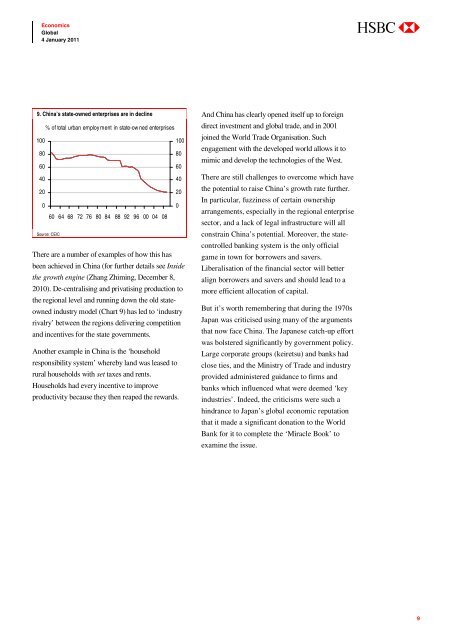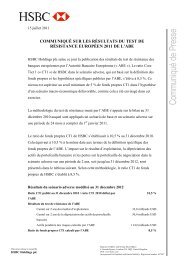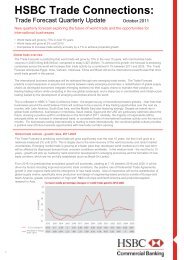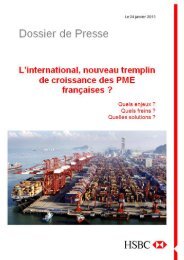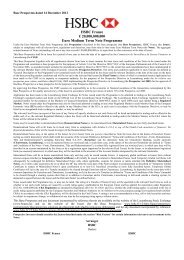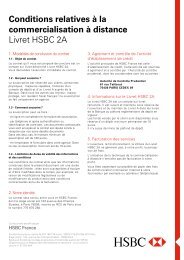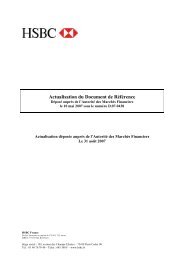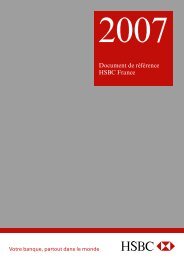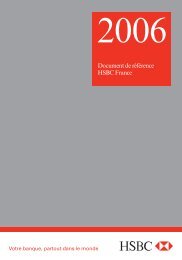The World in 2050-Quantifying the shift in the global economy - HSBC
The World in 2050-Quantifying the shift in the global economy - HSBC
The World in 2050-Quantifying the shift in the global economy - HSBC
- No tags were found...
You also want an ePaper? Increase the reach of your titles
YUMPU automatically turns print PDFs into web optimized ePapers that Google loves.
EconomicsGlobal4 January 2011abc9. Ch<strong>in</strong>a’s state-owned enterprises are <strong>in</strong> decl<strong>in</strong>e% of total urban employ ment <strong>in</strong> state-ow ned enterprises10080100806060404020200060 64 68 72 76 80 84 88 92 96 00 04 08Source: CEIC<strong>The</strong>re are a number of examples of how this hasbeen achieved <strong>in</strong> Ch<strong>in</strong>a (for fur<strong>the</strong>r details see Inside<strong>the</strong> growth eng<strong>in</strong>e (Zhang Zhim<strong>in</strong>g, December 8,2010). De-centralis<strong>in</strong>g and privatis<strong>in</strong>g production to<strong>the</strong> regional level and runn<strong>in</strong>g down <strong>the</strong> old stateowned<strong>in</strong>dustry model (Chart 9) has led to ‘<strong>in</strong>dustryrivalry’ between <strong>the</strong> regions deliver<strong>in</strong>g competitionand <strong>in</strong>centives for <strong>the</strong> state governments.Ano<strong>the</strong>r example <strong>in</strong> Ch<strong>in</strong>a is <strong>the</strong> ‘householdresponsibility system’ whereby land was leased torural households with set taxes and rents.Households had every <strong>in</strong>centive to improveproductivity because <strong>the</strong>y <strong>the</strong>n reaped <strong>the</strong> rewards.And Ch<strong>in</strong>a has clearly opened itself up to foreigndirect <strong>in</strong>vestment and <strong>global</strong> trade, and <strong>in</strong> 2001jo<strong>in</strong>ed <strong>the</strong> <strong>World</strong> Trade Organisation. Suchengagement with <strong>the</strong> developed world allows it tomimic and develop <strong>the</strong> technologies of <strong>the</strong> West.<strong>The</strong>re are still challenges to overcome which have<strong>the</strong> potential to raise Ch<strong>in</strong>a’s growth rate fur<strong>the</strong>r.In particular, fuzz<strong>in</strong>ess of certa<strong>in</strong> ownershiparrangements, especially <strong>in</strong> <strong>the</strong> regional enterprisesector, and a lack of legal <strong>in</strong>frastructure will allconstra<strong>in</strong> Ch<strong>in</strong>a’s potential. Moreover, <strong>the</strong> statecontrolledbank<strong>in</strong>g system is <strong>the</strong> only officialgame <strong>in</strong> town for borrowers and savers.Liberalisation of <strong>the</strong> f<strong>in</strong>ancial sector will betteralign borrowers and savers and should lead to amore efficient allocation of capital.But it’s worth remember<strong>in</strong>g that dur<strong>in</strong>g <strong>the</strong> 1970sJapan was criticised us<strong>in</strong>g many of <strong>the</strong> argumentsthat now face Ch<strong>in</strong>a. <strong>The</strong> Japanese catch-up effortwas bolstered significantly by government policy.Large corporate groups (keiretsu) and banks hadclose ties, and <strong>the</strong> M<strong>in</strong>istry of Trade and <strong>in</strong>dustryprovided adm<strong>in</strong>istered guidance to firms andbanks which <strong>in</strong>fluenced what were deemed ‘key<strong>in</strong>dustries’. Indeed, <strong>the</strong> criticisms were such ah<strong>in</strong>drance to Japan’s <strong>global</strong> economic reputationthat it made a significant donation to <strong>the</strong> <strong>World</strong>Bank for it to complete <strong>the</strong> ‘Miracle Book’ toexam<strong>in</strong>e <strong>the</strong> issue.9


